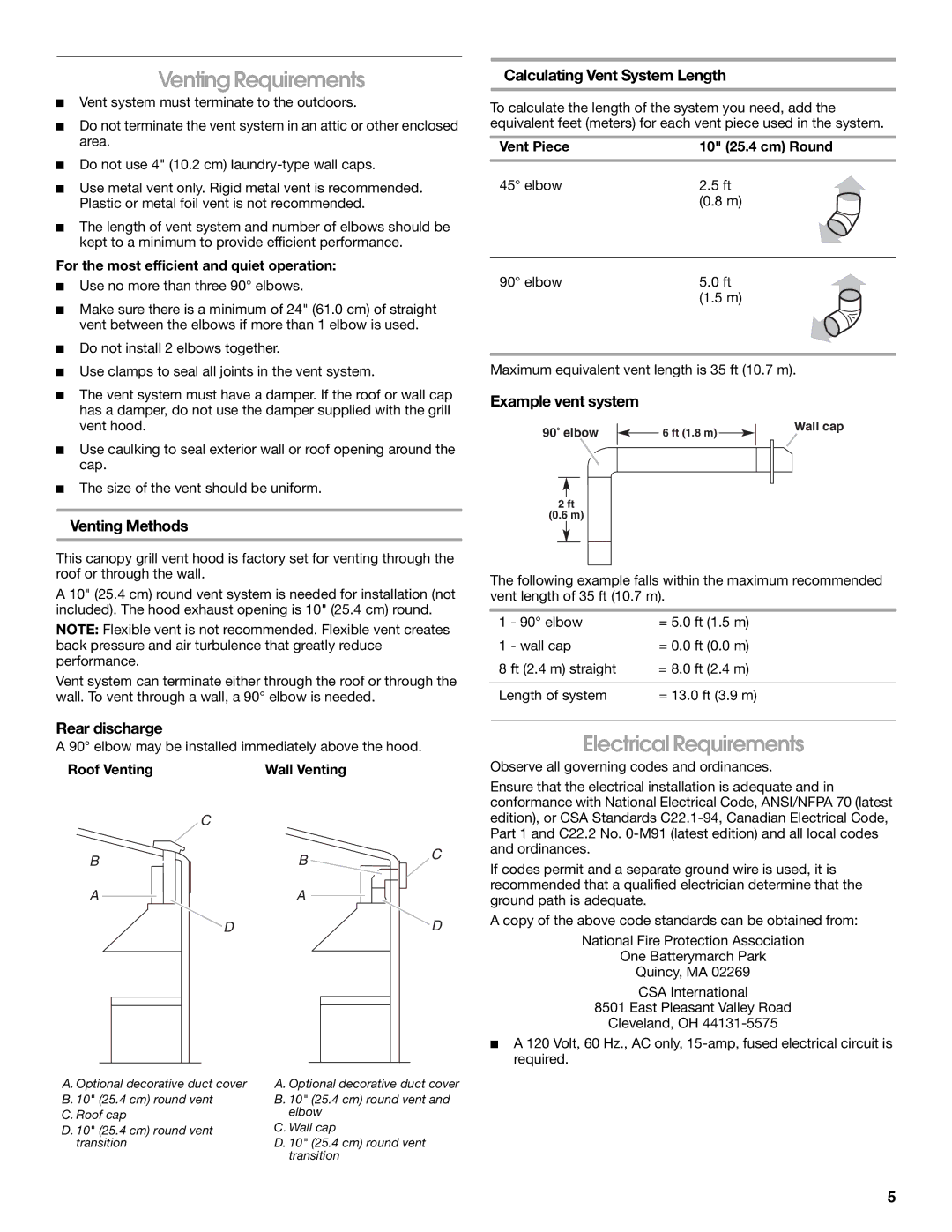
Venting Requirements
■Vent system must terminate to the outdoors.
■Do not terminate the vent system in an attic or other enclosed area.
■Do not use 4" (10.2 cm)
■Use metal vent only. Rigid metal vent is recommended. Plastic or metal foil vent is not recommended.
■The length of vent system and number of elbows should be kept to a minimum to provide efficient performance.
For the most efficient and quiet operation:
■Use no more than three 90° elbows.
■Make sure there is a minimum of 24" (61.0 cm) of straight vent between the elbows if more than 1 elbow is used.
■Do not install 2 elbows together.
■Use clamps to seal all joints in the vent system.
■The vent system must have a damper. If the roof or wall cap has a damper, do not use the damper supplied with the grill vent hood.
■Use caulking to seal exterior wall or roof opening around the cap.
■The size of the vent should be uniform.
Venting Methods
This canopy grill vent hood is factory set for venting through the roof or through the wall.
A 10" (25.4 cm) round vent system is needed for installation (not included). The hood exhaust opening is 10" (25.4 cm) round.
NOTE: Flexible vent is not recommended. Flexible vent creates back pressure and air turbulence that greatly reduce performance.
Vent system can terminate either through the roof or through the wall. To vent through a wall, a 90° elbow is needed.
Calculating Vent System Length
To calculate the length of the system you need, add the equivalent feet (meters) for each vent piece used in the system.
Vent Piece | 10" (25.4 cm) Round |
45° elbow | 2.5 ft |
| (0.8 m) |
90° elbow | 5.0 ft |
| (1.5 m) |
Maximum equivalent vent length is 35 ft (10.7 m).
Example vent system
90 elbow |
|
|
|
|
|
| Wall cap | ||
|
| 6 ft (1.8 m) |
|
| |||||
|
|
|
|
|
| ||||
|
|
|
|
|
|
|
|
|
|
|
|
|
|
|
|
|
|
|
|
|
|
|
|
|
|
|
|
|
|
2ft
(0.6 m)
The following example falls within the maximum recommended vent length of 35 ft (10.7 m).
1 | - 90° elbow | = 5.0 ft (1.5 m) |
1 | - wall cap | = 0.0 ft (0.0 m) |
8 ft (2.4 m) straight | = 8.0 ft (2.4 m) | |
|
| |
Length of system | = 13.0 ft (3.9 m) | |
Rear discharge
A 90° elbow may be installed immediately above the hood.
Roof Venting | Wall Venting |
|
C |
|
|
B | B | C |
| ||
A | A |
|
D |
| D |
A. Optional decorative duct cover | A. Optional decorative duct cover |
B. 10" (25.4 cm) round vent | B. 10" (25.4 cm) round vent and |
C. Roof cap | elbow |
D. 10" (25.4 cm) round vent | C. Wall cap |
transition | D. 10" (25.4 cm) round vent |
| transition |
Electrical Requirements
Observe all governing codes and ordinances.
Ensure that the electrical installation is adequate and in conformance with National Electrical Code, ANSI/NFPA 70 (latest edition), or CSA Standards
If codes permit and a separate ground wire is used, it is recommended that a qualified electrician determine that the ground path is adequate.
A copy of the above code standards can be obtained from:
National Fire Protection Association
One Batterymarch Park
Quincy, MA 02269
CSA International
8501 East Pleasant Valley Road
Cleveland, OH
■A 120 Volt, 60 Hz., AC only,
5
